Jungsik (New York, NY)
Jungsik Restaurant
2 Harrison St, New York, NY 10013
212-219-0900
www.jungsik.com
Sat 12/02/2023, 05:00p-07:15p

For the final dinner of my recent side trip to NYC, I returned to Tribeca to dine at a restaurant that I'd been wanting to try for the better part of a decade. Jungsik was opened back in 2011 by Chef Jungsik Yim, and is essentially the birthplace of modern Korean cuisine (in the US). It's a genre of cooking that has since grown to be quite influential at the higher echelons of the American dining scene, so I definitely wanted to experience the O.G. for myself.
About the Chef: Yim Jung-sik (임정식) was born in January 1978, and grew up in Suwon. He wasn't particularly interested in cooking as a youngster, but was forced to learn after he started his mandatory military service at age 19. After he got out of the army, he wanted to pursue a career in hospitality, and thus sought out jobs in Seoul, first at a bar, then a rice cake shop, and then a bakery. In 2003, Yim relocated to New York in order to study at the Culinary Institute of America at Hyde Park, where he educated himself in Western cuisine and actually met many of his future employees. Following graduation in 2005, he trained at Aquavit and Bouley in New York, then ate his way around Europe and returned to South Korea. He then went to Spain in 2007, where he apprenticed at both Zuberoa and Akelarre.
Back in Seoul, he was now ready to open his own restaurant, and thus debuted Jung Sik Dang (정식당) in January 2009, located at 567-28 Sinsa-dong in Gangnam. Curiously, the name was meant to be a pun, combing jeongsik (meaning a full-course meal, and the Chef's first name) with sikdang (meaning restaurant). The place generated a fair amount of buzz for its "New Korean" cooking, and in spring 2010, Yim moved Jungsik Dang to a new location at 649-7 Sinsa-dong, near Dosan Park. The original location was converted to a casual eatery called Anzu, which has since shuttered and is now home to an outpost of bunsik specialist School Food. Not long after, the Chef signed a lease on a space in New York City, and the second Jungsik ended up debuting on September 12th, 2011.
Business wasn't particularly brisk at first, but did steadily improve, especially after the place was awarded a Michelin star in October 2012 (the first Korean restaurant to achieve the feat). A second star arrived the following October (another first), and has been retained ever since. In 2014, the Seoul restaurant moved to its current location in Cheongdam-dong, while an attached wine bar called Jungsik Bar launched in 2015. November 2016 saw the restaurant attain a Michelin star in the inaugural Seoul guide, while a second came just a year later, and has also been maintained.
In January 2018, Yim opened Pyunghwaok (평화옥, or "Peace House") at Incheon International Airport. Serving a menu of casual Korean staples, the restaurant expanded to the Hyundai Department Store (World Trade Center) in May 2018, as well as a multi-concept food space called Regular Six in June 2019. However, the mini chain shuttered in April 2020 due to financial malfeasance. In April 2019, Jungsik Bar was turned into an easy-going all-day spot called Jungsik Cafe (정식카페). Yim's latest venture is I Pho U (아이뽀유), a Vietnamese concept that opened in August 2020 inside Hotel Anteroom Seoul.
Unsurprisingly, Yim doesn't spend most of his time here in New York, so the day-to-day is run by Executive Chef Daeik Kim (김대익), a native of Gangwon Province who started cooking for himself at an early age, as both his parents worked. He was also taught by his mother, and went on to attend culinary school in Korea. He subsequently moved to Australia to broaden his skillset, then came to New York to study at the Culinary Institute of America. After graduating in 2018, he joined the team at Jungsik as a sous, and worked his way up the ranks, eventually being promoted to EC in September 2021, replacing Suyoung Park.

Jungsik takes over the former home of David Waltuck's longstanding Chanterelle, which closed in 2009. Shown above is the dining room, an elegant, relatively subdued space that can accommodate up to 32 guests. There's also a bar area, as well as a private dining room that can seat an additional 18.
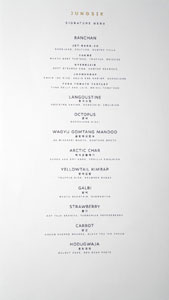
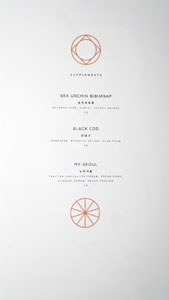
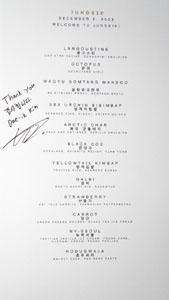
Jungsik's Signature Menu was priced at a pre-paid $295, plus $26.18 tax and a $5 Tock fee, while standard/premium/non-alcoholic pairings were offered at $200/$500/$115. The restaurant's cocktail list and selection of wines by the glass, sul, beer, tea, spirits and sundry other beverages can be viewed here, while Cameron Dellinger's full wine list is provided here. Click for larger versions.
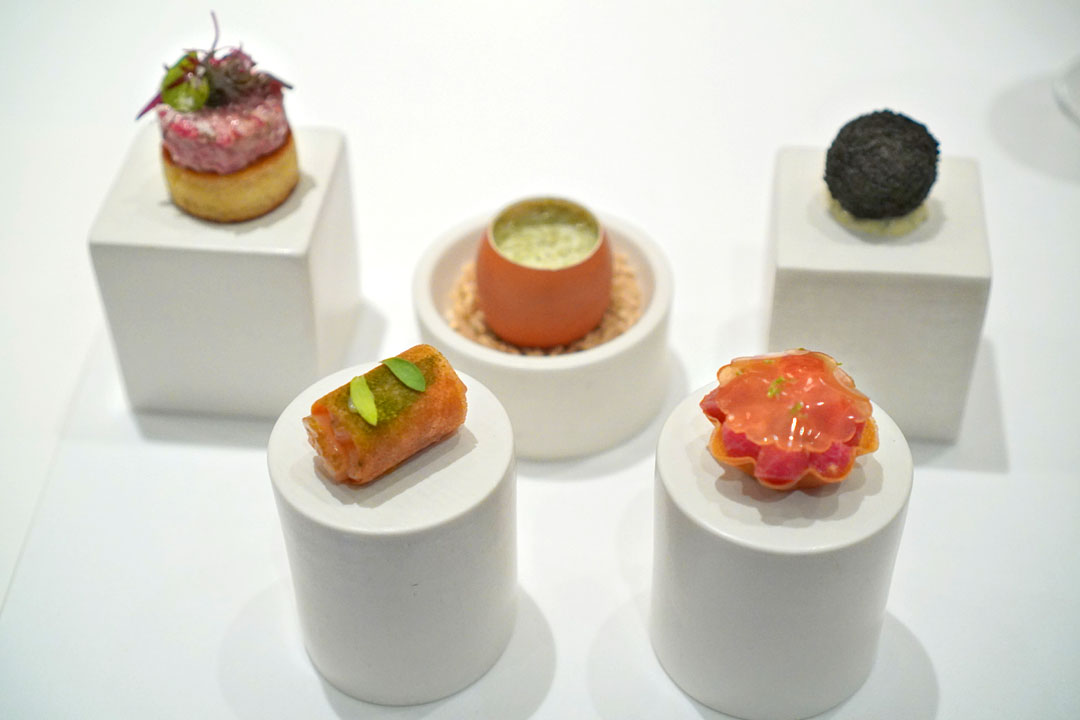
A meal at Jungsik begins with an array of banchan, reimagined as amuse-bouches.
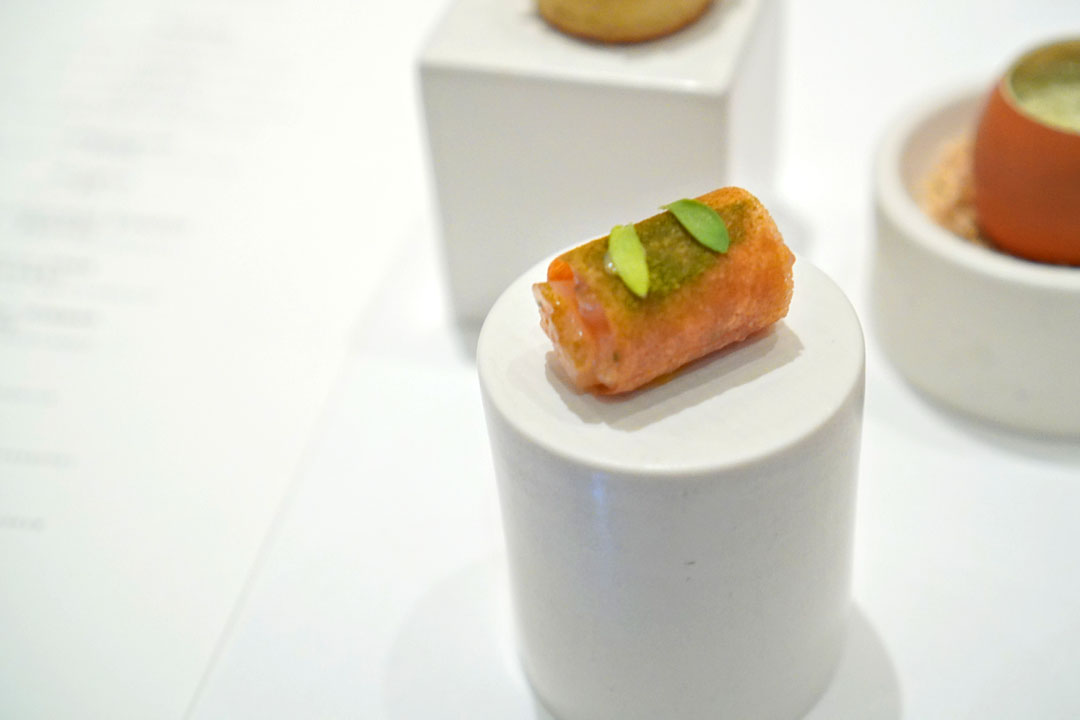
1a: Jet-Bang-Uh | Doenjang, Celtuce, Gamtae Tuile
I began with the jaetbang-eo, or amberjack, which was paired with dueling forces of earthy soybean paste and juicy Granny Smith apple, while a delicate seaweed powder-enriched tuile offered up a well-placed crunch.
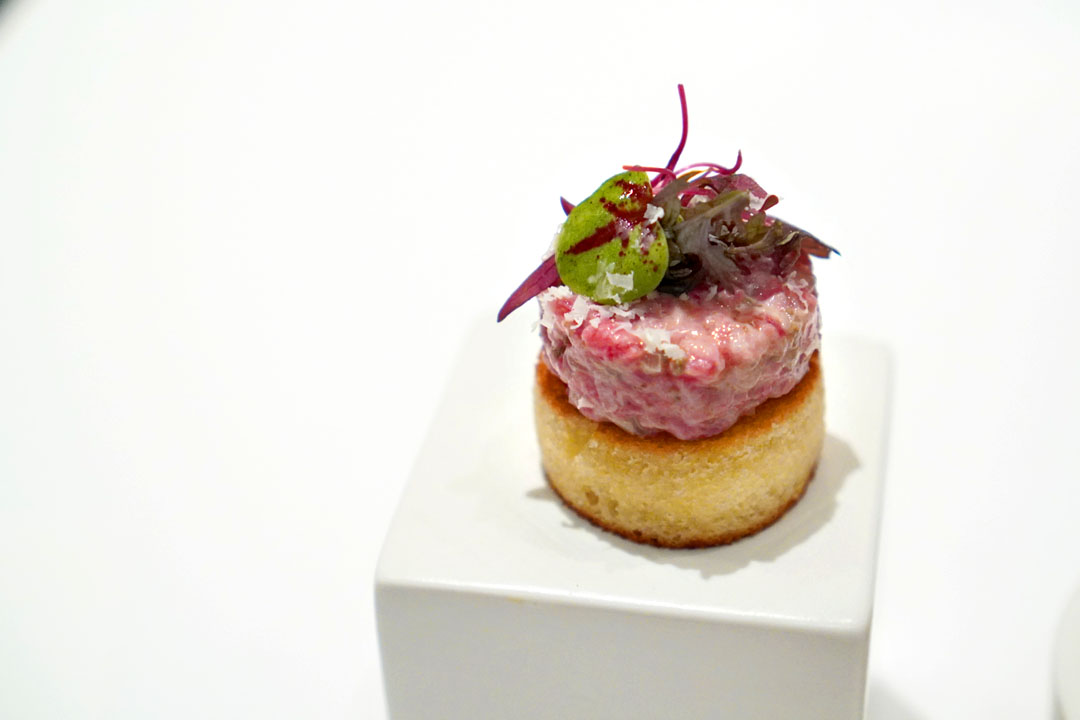
1b: Yukwe | Wagyu Beef Tartare, Truffle, Brioche
This take on a classic tartare was pretty spot-on, the beef arriving full-flavored, gratifyingly-textured, and paired with complementary flavors of cheese and truffle. At the same time, the bread moderated all the elements at play, and provided a nice toasty finish to the bite.
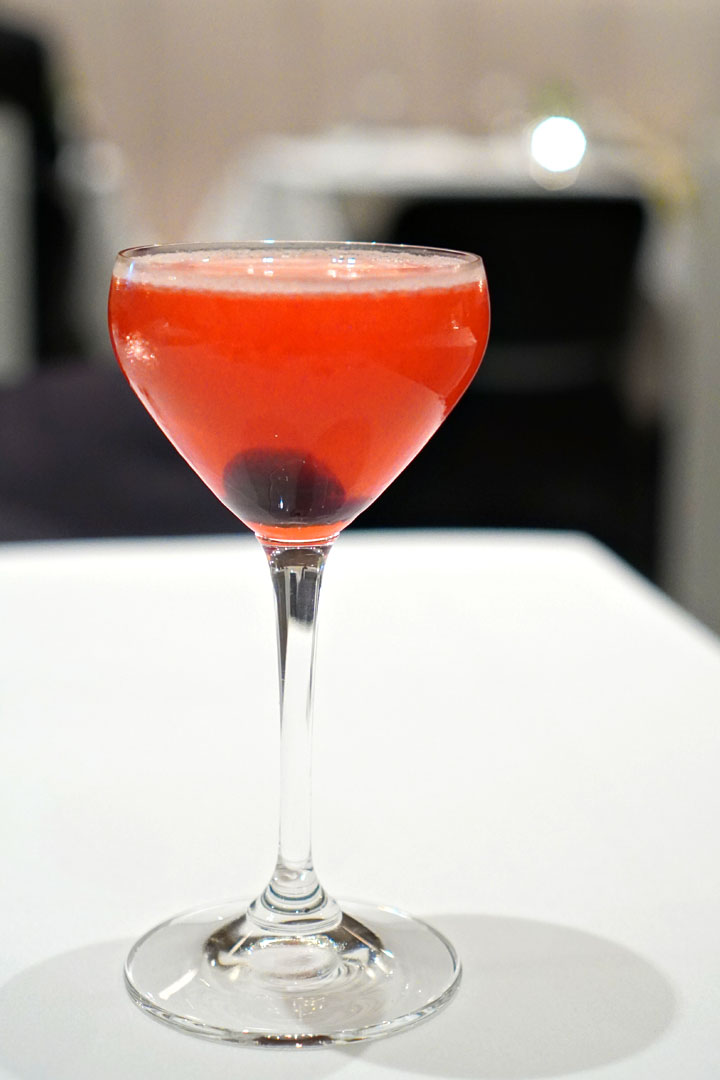
Bussanhaeng [$22.00] | Montreuil Calvados, Absinthe, Pinot Noir Juice
I opted for cocktails tonight, which are the creation of Head Bartender Romeo Lacandola. I began with this Train to Busan-inspired concoction due to its use of calvados, and quite liked its zippy, multifaceted fruitiness, backed by a pronounced herbaceousness from the absinthe.
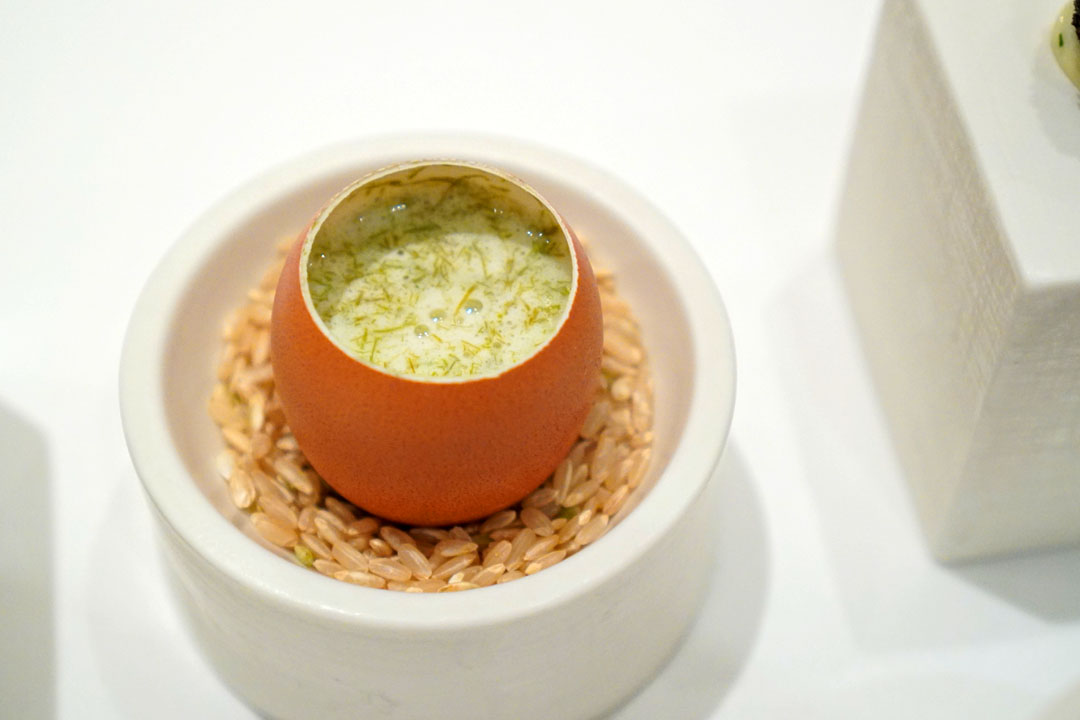
1c: Gyeranjjim | Soft Steamed Egg, Gamtae Seaweed
The steamed egg ate as supple and luscious as I was hoping for, and I loved the addition of that grassy, oceany seaweed, too--it's something that more restaurants should utilize in their gyeran-jjim.
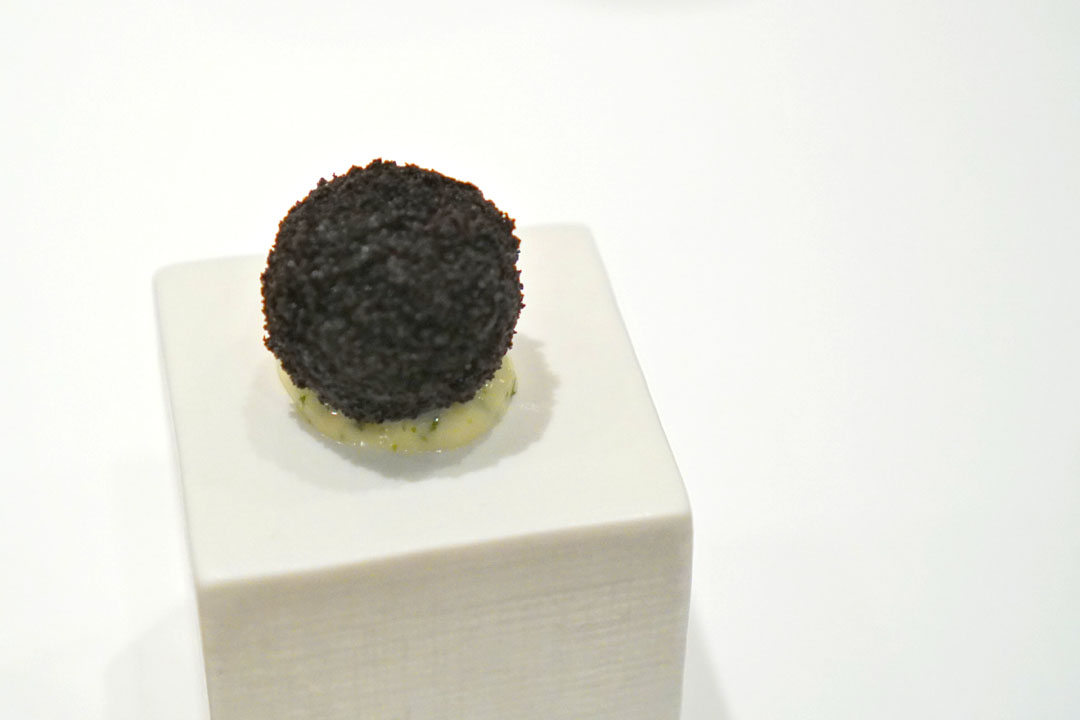
1d: Joomukbap | Squid Ink Rice, Squid and Shrimp, Gochujang
A truffle-looking jumeokbap was another winner. I was a big fan of the texture on both the rice and seafood here, and the bite's nutty, spicy-sweetness worked for me as well.
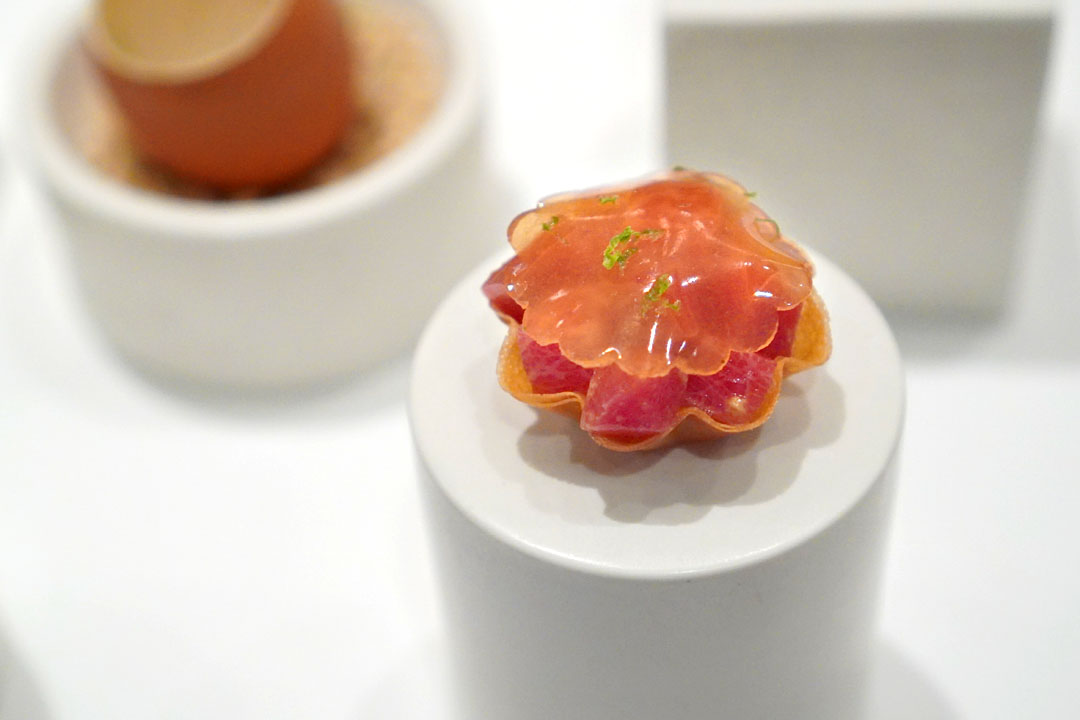
1e: Tuna Tomato Tartlet | Tuna Belly and Loin, Meisil Tomatoes
Spanish bluefin showed off a growing savoriness, one offset by the fresh, fruity nature of maesil-marinated tomatoes, tomato gelée, and lime zest, while the tart's pastry base offered up further contrast.
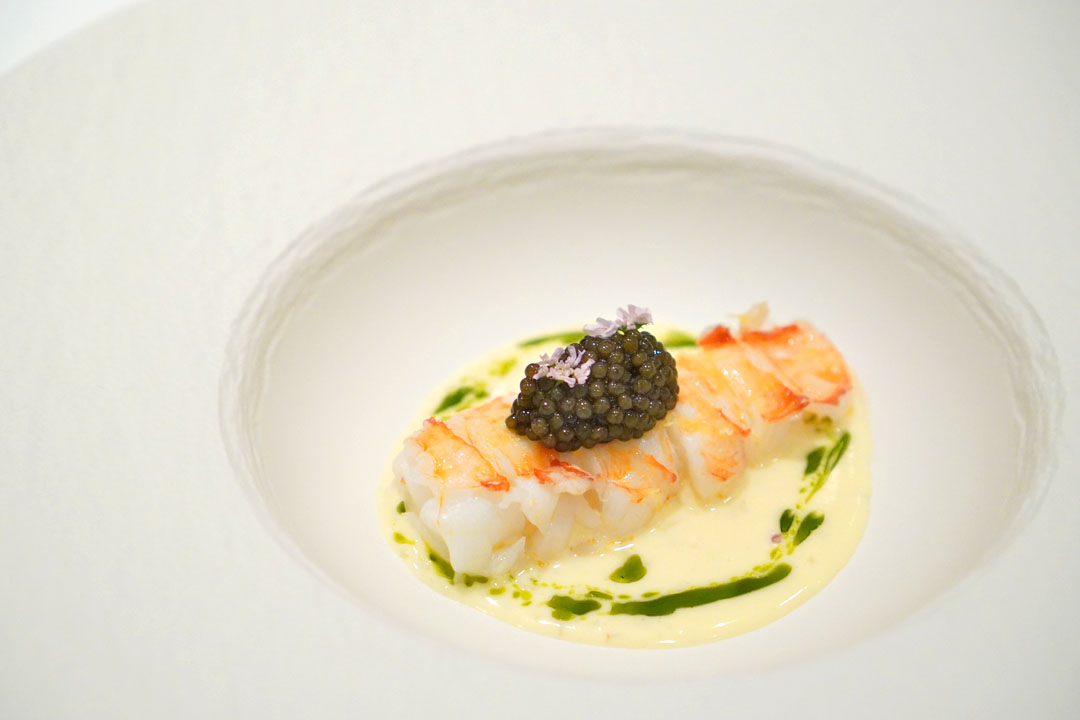
2: Langoustine 랑구스틴 | Oscietre Caviar, Dongchimi Emulsion
In my first proper course, binchotan-grilled Norweigian langoustine was superb texturally, and displayed a sweetness that linked up easily with the saltiness of the Ossetra. However, what really set this apart was that sauce, a creamy emulsion made from dongchimi broth and smoked butter, spiked with zingy anise oil.
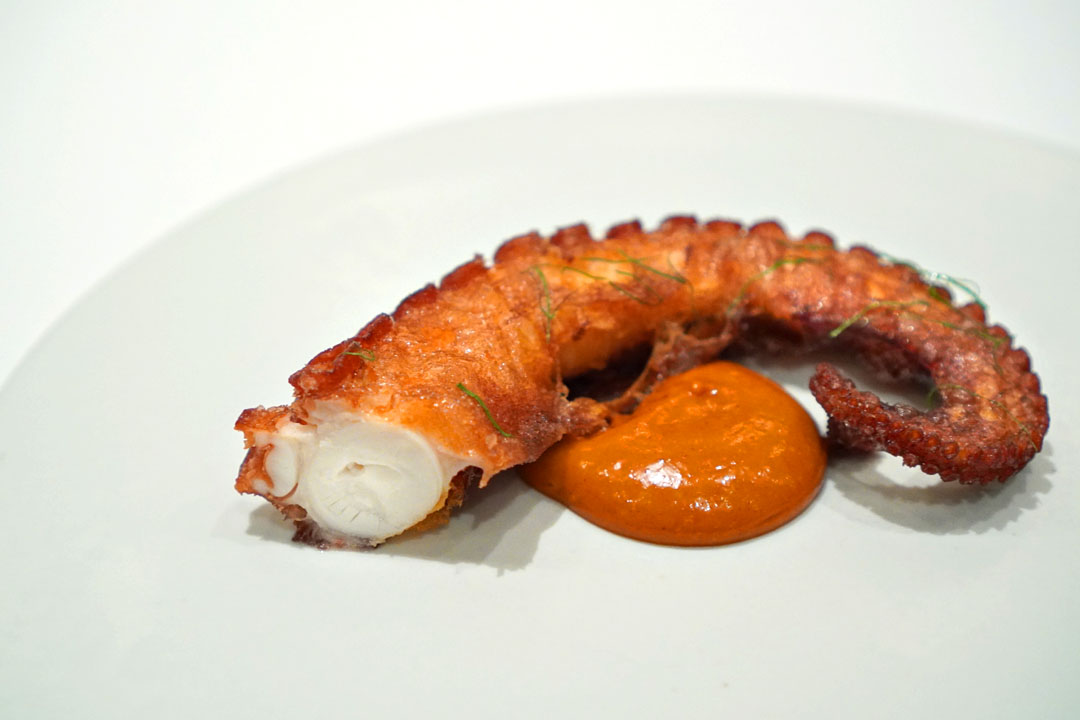
3: Octopus 문어 | Gochujang Aioli
In this thoroughly reimagined take on nakji-bokkeum, Spanish octopus was braised in dashi, resulting in a perfectly tender consistency and just the right amount of sweet salinity, while just as important was that crispy crust, which was super savory and oh-so satisfying. The mun-eo was delicious alone, but I also took a liking to the funky heat imparted by that gochujang condiment. This is often considered Jungsik's signature dish, and I can absolutely see why. It's actually a contender for the best octopus I've ever had.
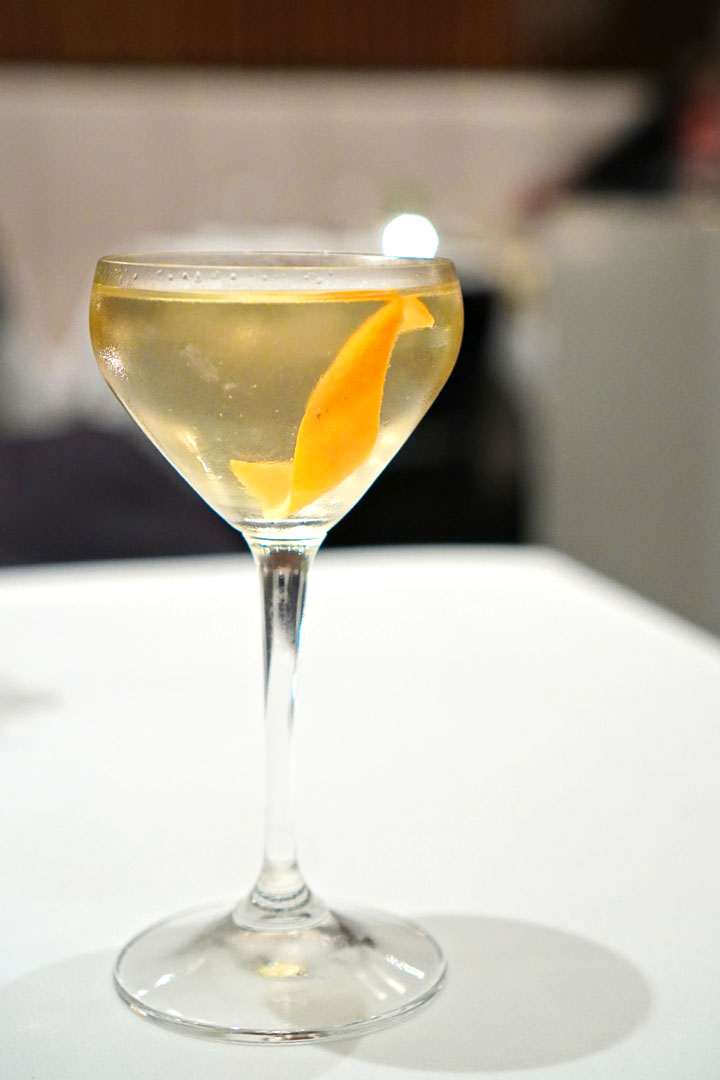
Bori Martini [$26.00] | Jung One, Damsol Pine, Lillet, Sesame, Bori
My next cocktail was a martini variation that really showcased the unmistakable nutty savor of sesame, juxtaposed against the freshness of pine and the roastiness of barley.
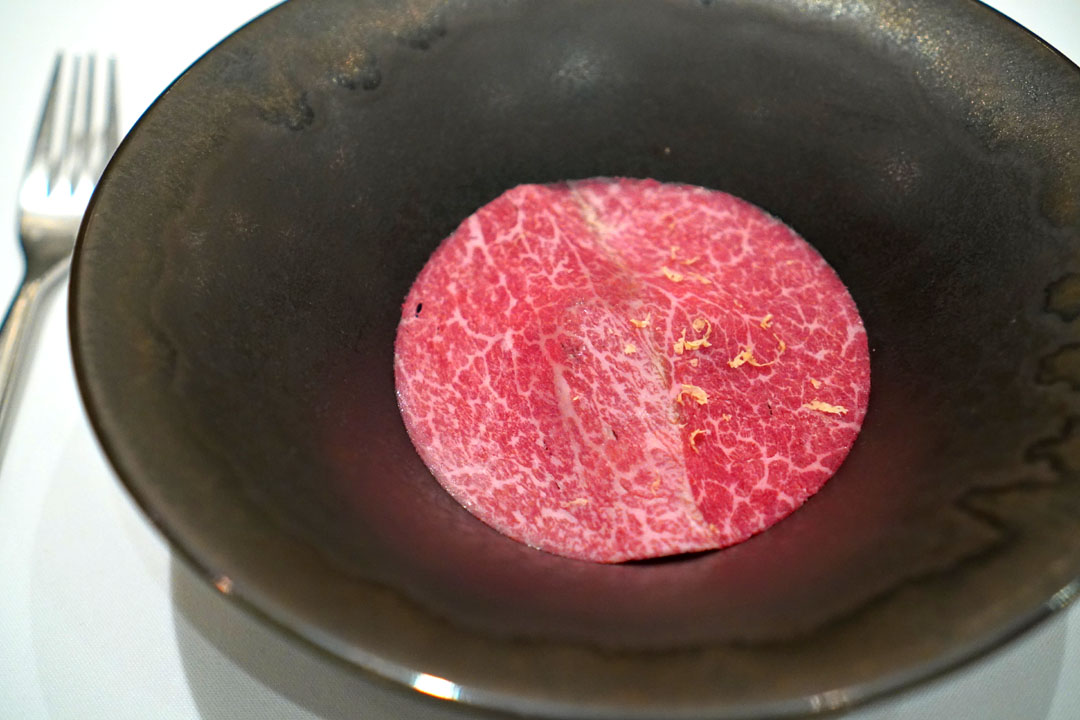
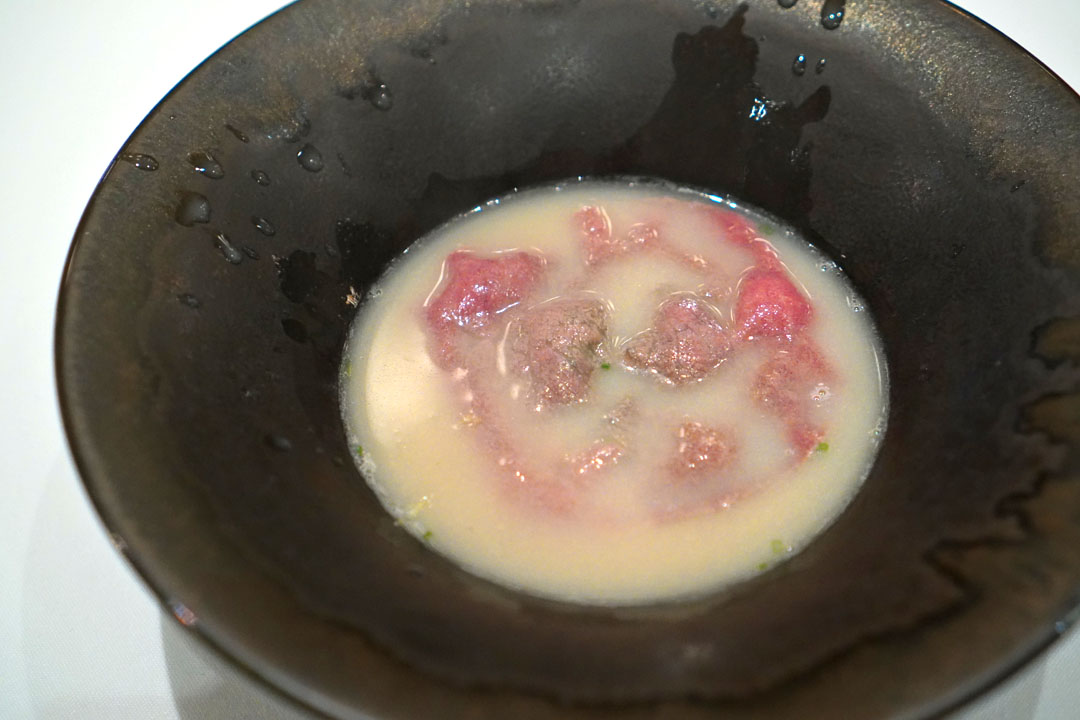
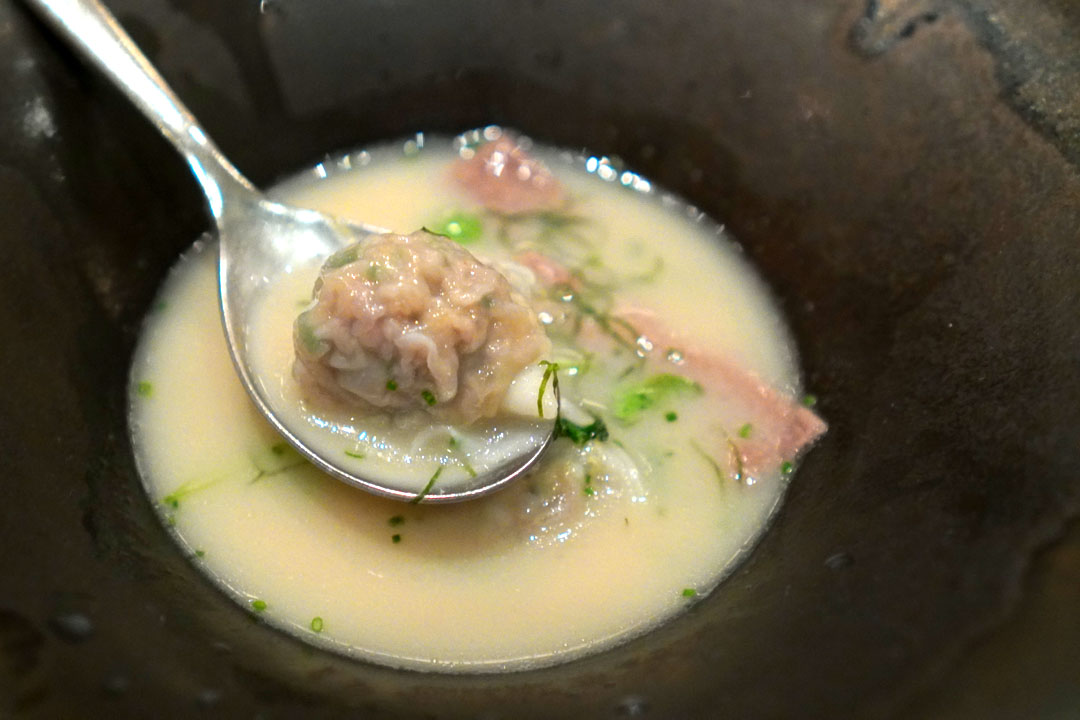
4: Wagyu Gomtang Mandoo 곰탕와규만두 | A5 Miyazaki Wagyu, Gomtang Broth
Wagyu mandu were excellent, tasting classic and comforting, with a superb veggie component. The dumplings paired like clockwork with the broth (made from boiling beef bones/feet/brisket for 24 hours), which was simultaneously heady yet light, with a great peppery edge. If that wasn't enough, a silky slice of A5 Miyazaki tenderloin was draped on top of the dish, amping up the deliciousness factor even further. Luxurious yet uncompromisingly cozy, this was another highlight for me.
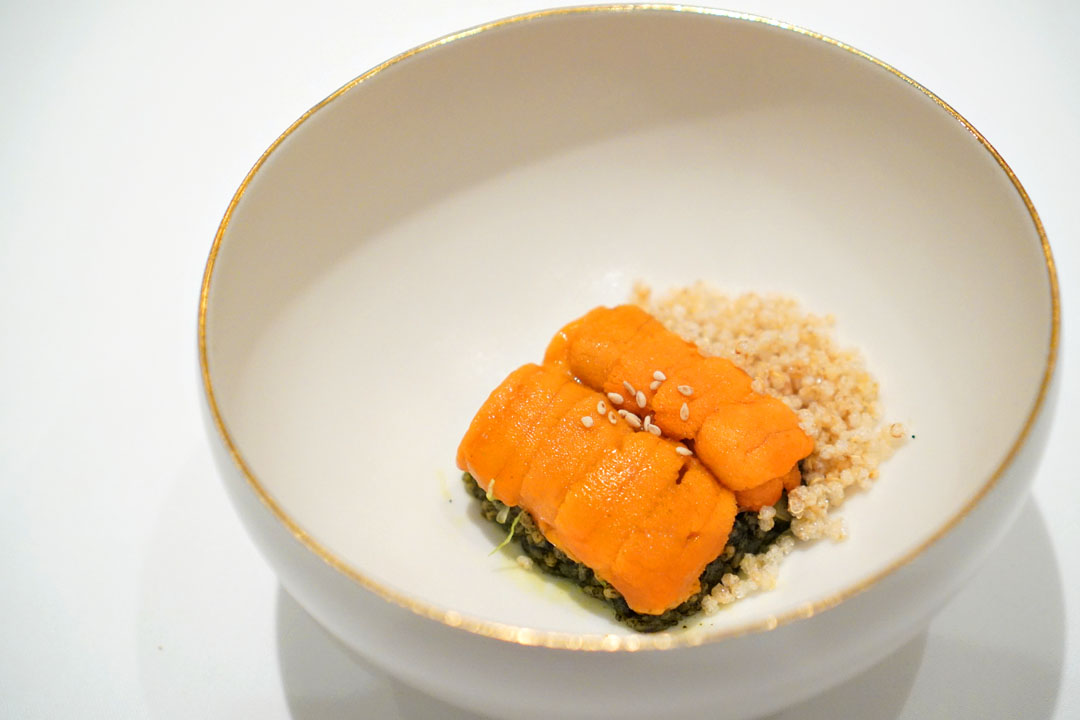
Supplement: Sea Urchin Bibimbap 성게비빔밥 [$75.00] | Seaweed Rice, Kimchi, Crispy Quinoa
Given my penchant for both sea urchin and bibimbap, this was a must-try for me, and did not disappoint. Sourced from Hokkaido, the seong-ge had that creamy, sweet, saline character that I wanted, and married effortlessly with the nuttiness and savoriness of quinoa, sesame, and roasted gim-boosted rice. This has been a signature Jungsik dish since pretty much the very beginning, and for good reason, but now I'm left wondering: would the dish be even better if done dolsot style, in order to get some nurungji action going?
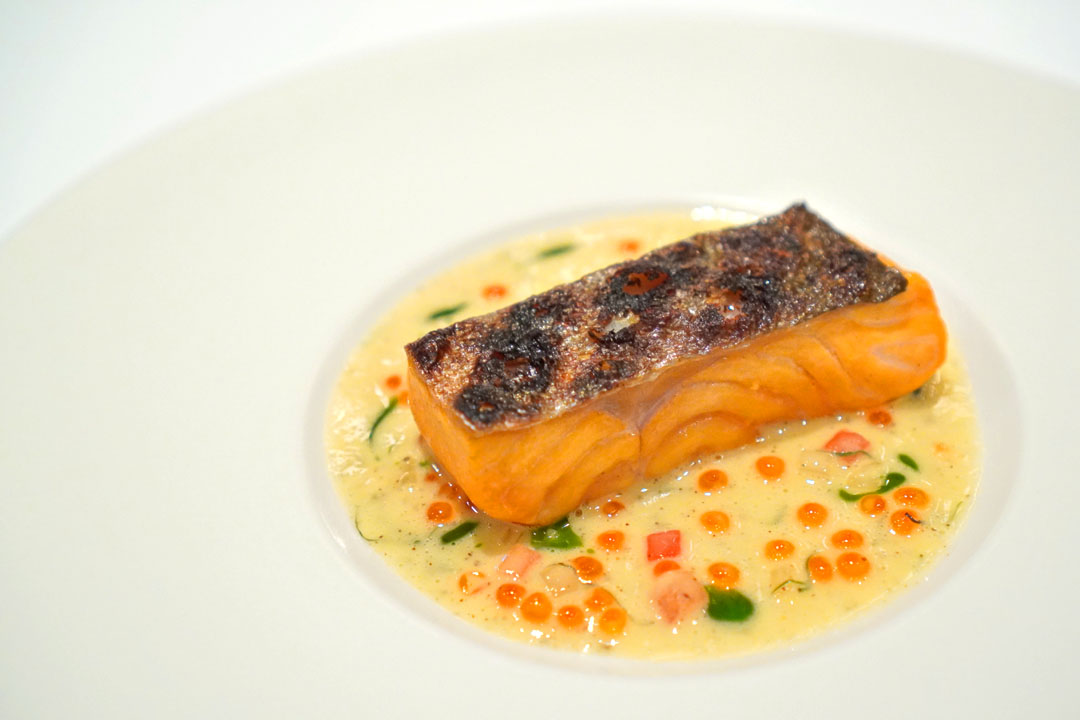
5: Arctic Char 북극 곤들매기 | Cured and Dry-Aged, Perilla Emulsion
Arctic char was cured with ginger, citrus, and herbs, then dry-aged, then grilled over binchotan, resulting in a properly rare cook and a delightfully crisp, salty, smoky skin. The fish was then accompanied by a piquant, herby emulsion incorporating perilla, kimchi, fermented tomato, and smoked trout roe.
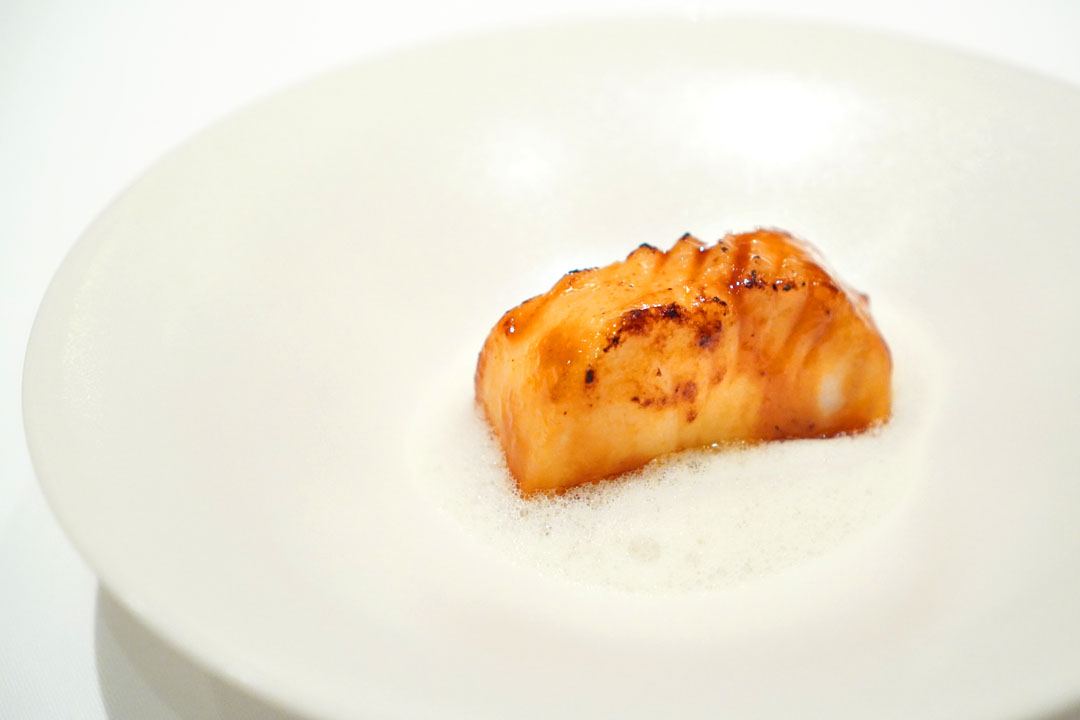
Supplement: Black Cod 은대구 [$45.00] | Doenjang, Shishito Relish, Clam Foam
Alaskan eundaegu was marinated overnight in fermented soybean paste, cooked to caramelized perfection, then served with a shishito jangajji and clam foam. I'm pretty sure that this was the best black cod I've ever had. I loved its super luscious, flaky consistency and buttery goodness, while the doenjang contributed a wonderfully sweet earthiness. Furthermore, the clam imparted a refined saline edge to the fish, while the pickled peppers gave things a prickly heat that served as a great accent piece.
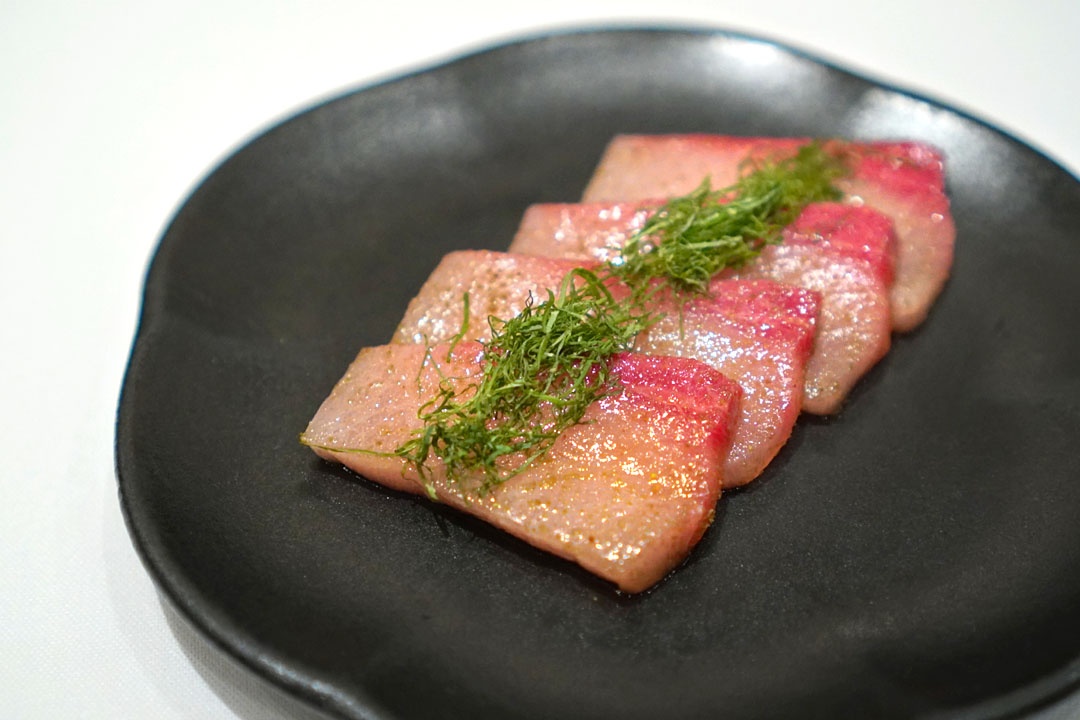
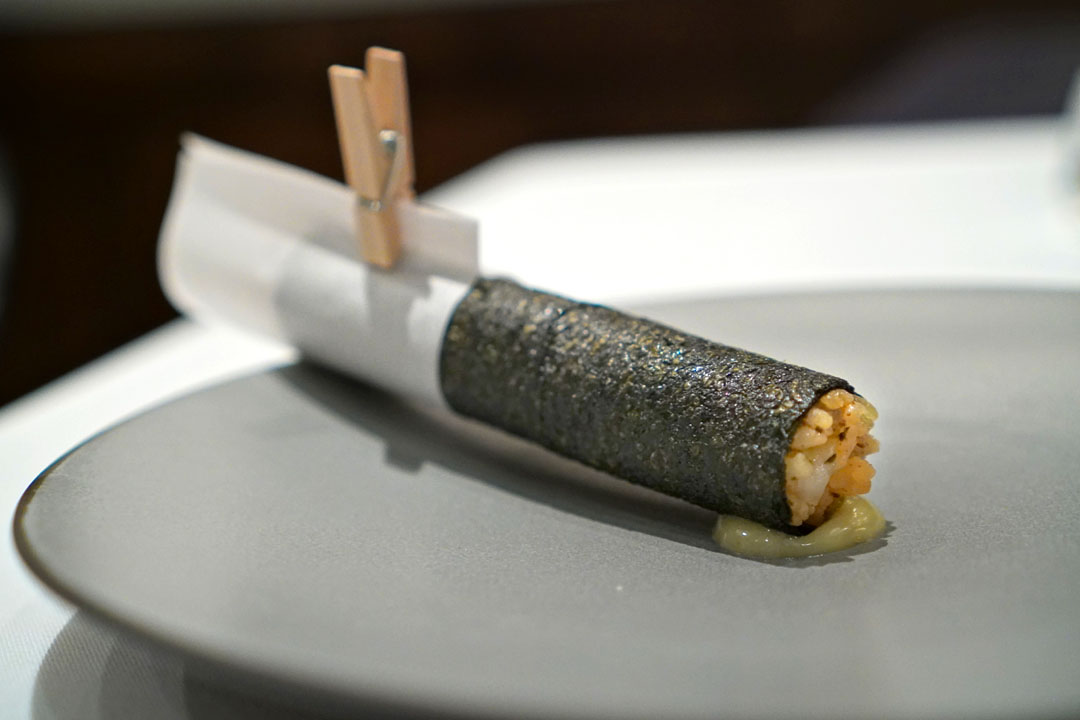
6: Yellowtail Kimbap 방어김밥 | Truffle Rice, Seaweed Bugak
Fatty slices of bang-eo arrived dressed in a particularly nutty soy sauce and garnished with green shiso. The fish was delish alone, but really sang when eaten with the roll, which featured beautifully seasoned truffle rice and zesty kimchi wrapped in some wondrously crispy, grassy seaweed. It was pretty much a match made in heaven. Yum.
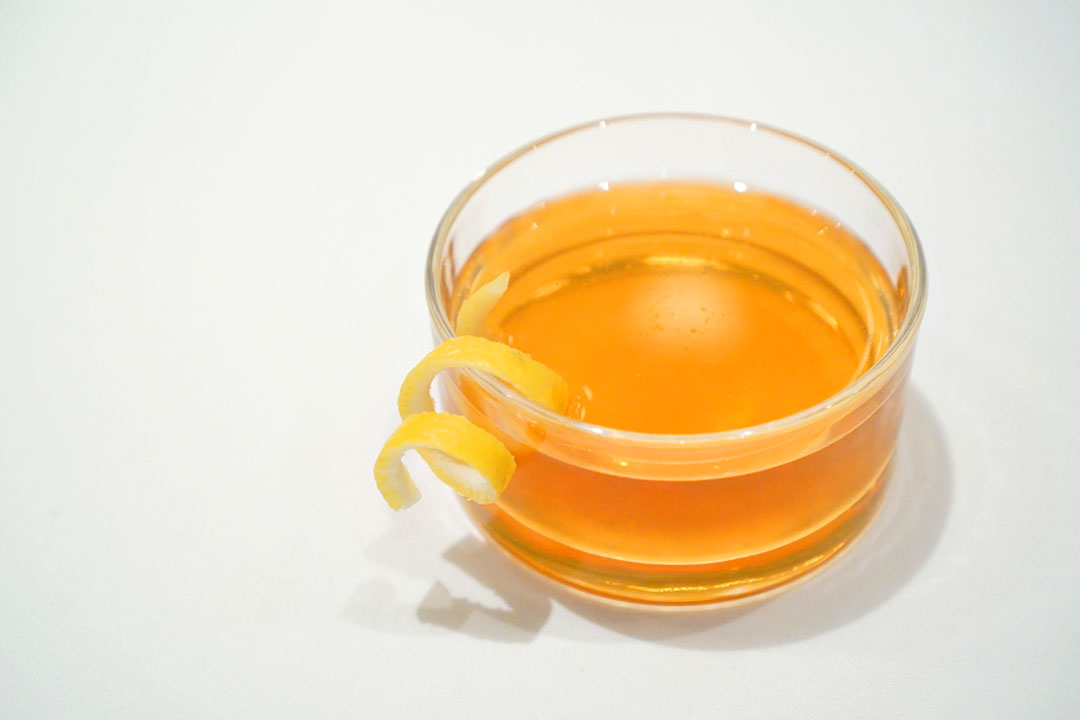
Perthimmon Saz [$22.00] | New Riff Balboa Rye, Persimmon, Apricot, Absinthe, Red Shiso
My final cocktail was this rejiggered Sazerac, with its lovely fruitiness right up front, effectively countered by a bevy of bitter, herby nuances.
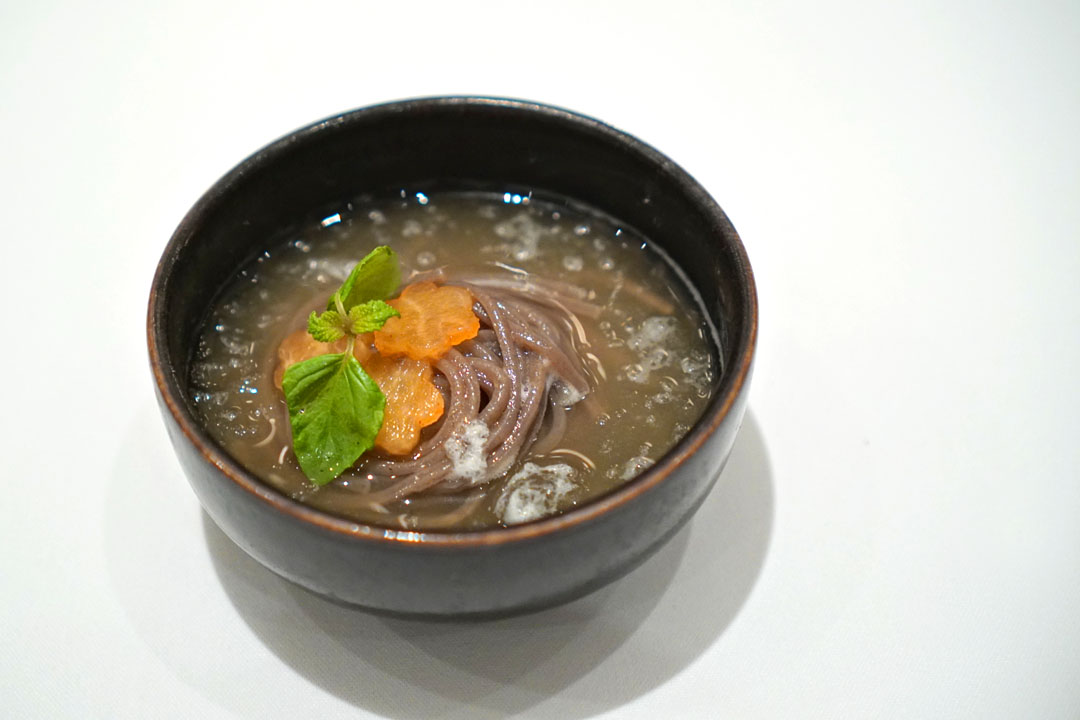
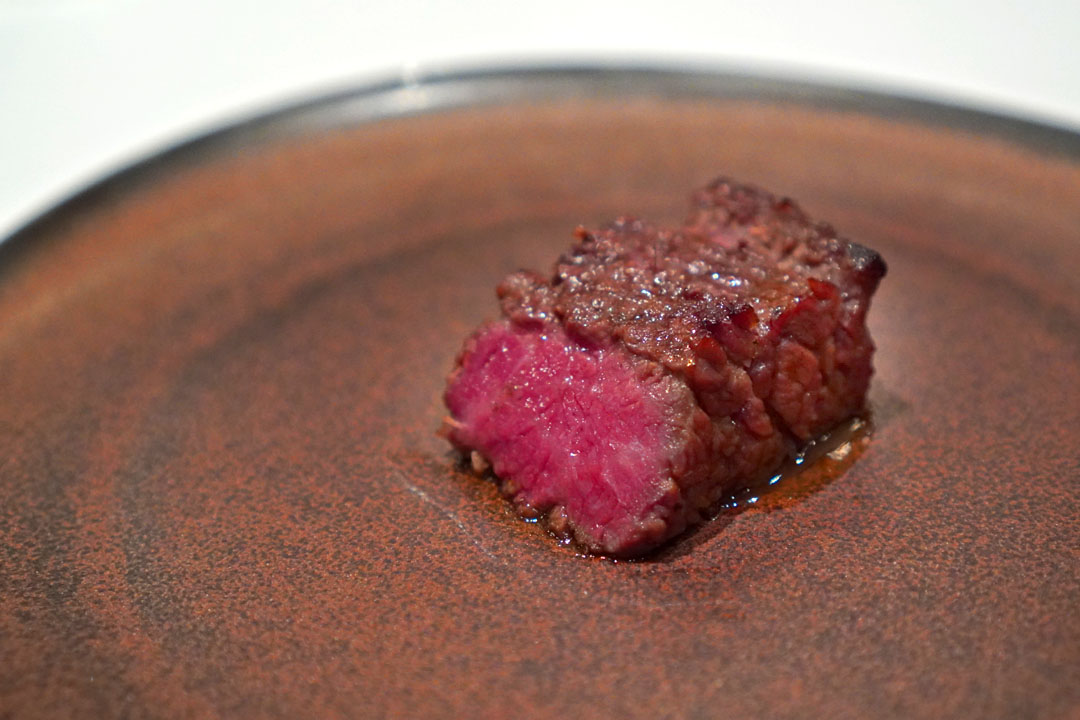
7: Galbi 갈비 | Wagyu Shortrib, Naengmyun
Four-day-marinated galbi ate supple and fatty, with a familiar sweetness that, fortunately, didn't overwhelm the meat, though I would've liked a bit more smoke and sear, especially since the cut was finished over a binchotan grill. The beef was served with a bowl of mul naengmyeon, and I thoroughly enjoyed the nutty, chewy nature of the noodles, as well as that super refreshing, beef-boosted broth, with its touches of funk and heat.
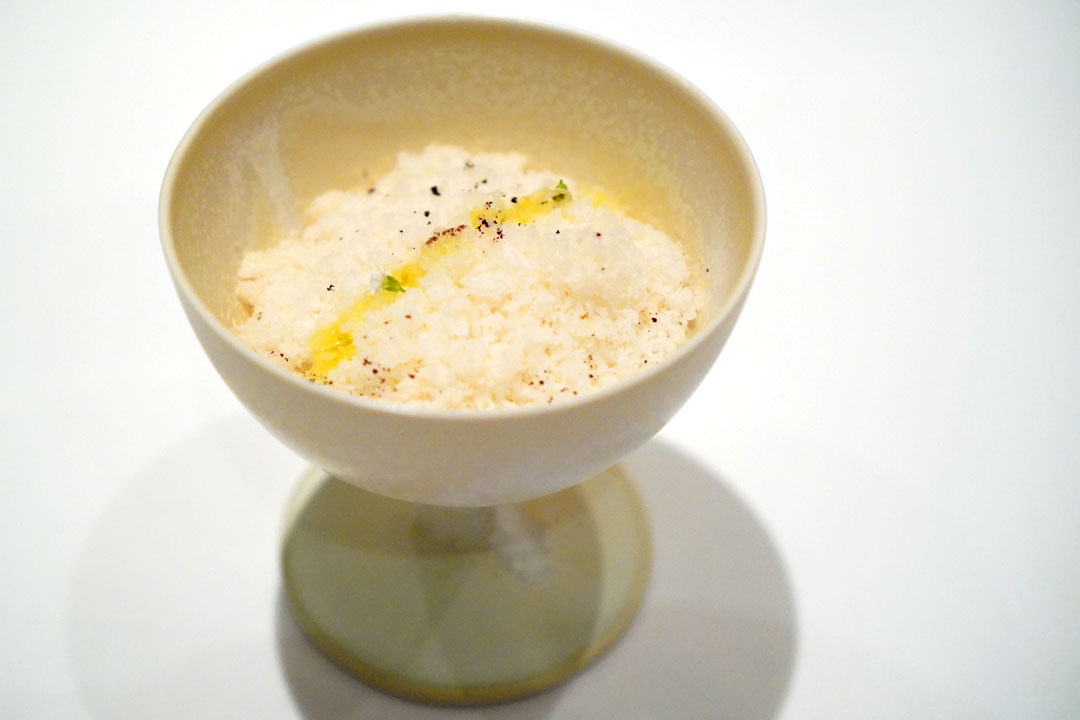
8: Strawberry 딸기 | Oat Yuja Granita, Tasmanian Pepperberry
Desserts are the charge of Eunchong Kim, another alumna of the original Jungsik who started here in 2022. In my first dessert, a Harry's Berries strawberry sorbet was combined with frozen raspberries and almonds, then topped with an oat-yuzu granita, a drizzle of olive oil, and a sprinkling of Tasmanian pepperberries. Flavors were delectably jammy and tart, as well as simultaneously nutty, with overarching notes of refreshing citrus and just a tinge of pepperiness.
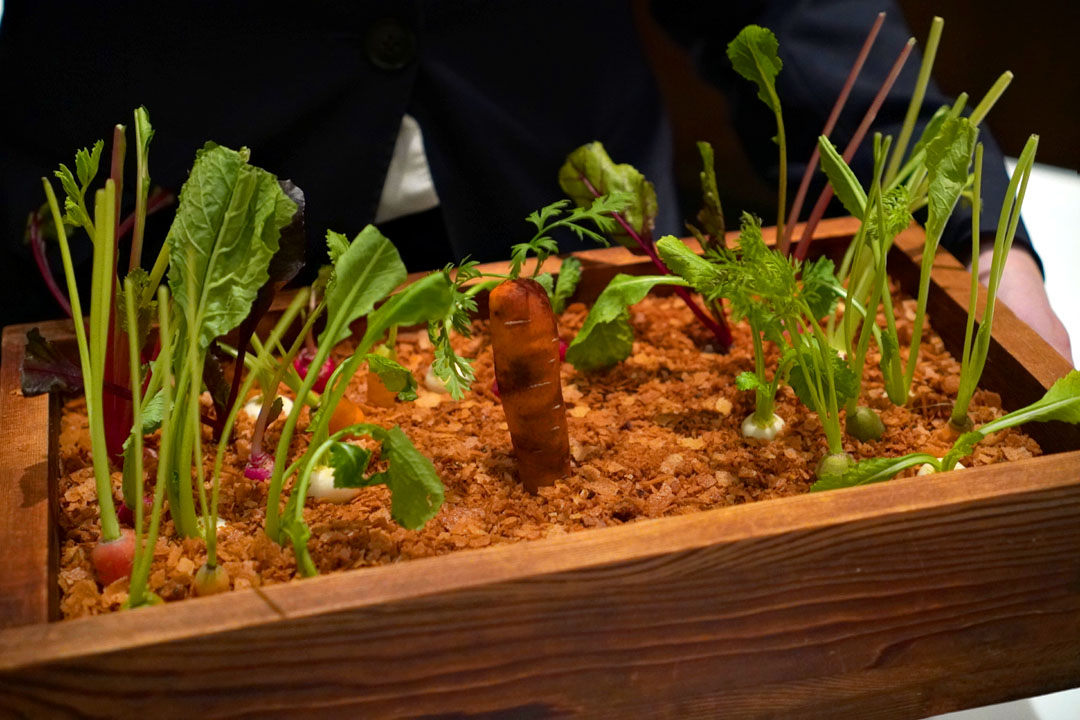
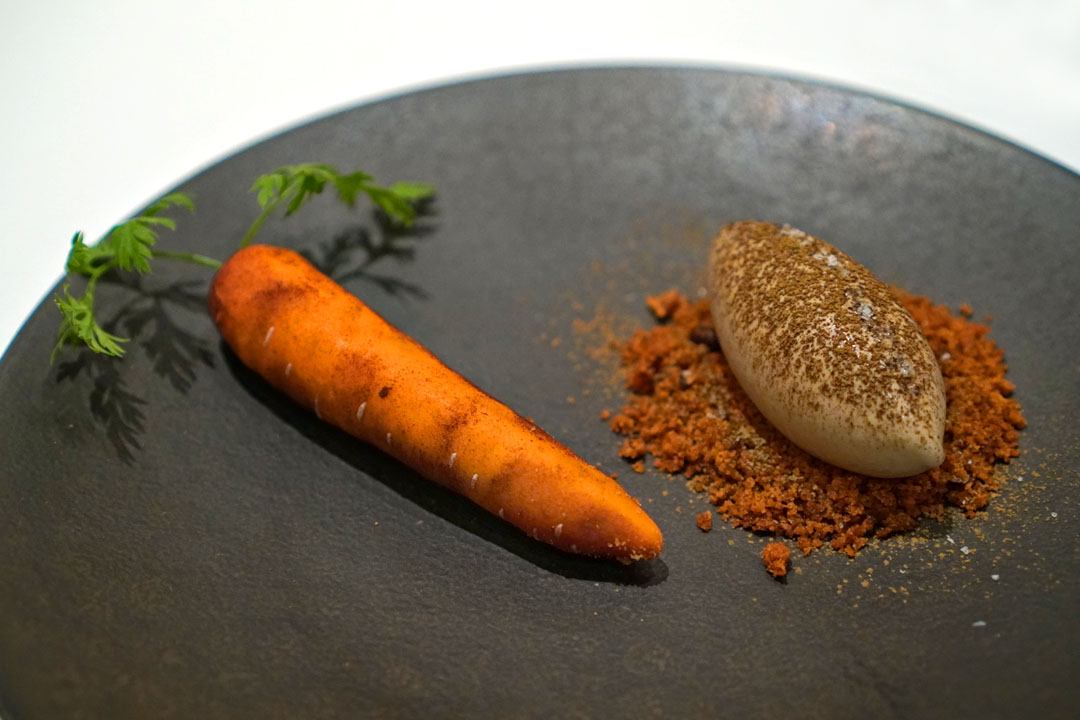
9: Carrot 당근 | Cream Cheese Mousse, Black Tea Ice Cream
In this rather playful dessert, I was asked to "harvest" a "carrot" composed of carrot cake, pecan praline, and cream cheese mousse, all encased in painted white chocolate. It really had that carrot-y sweetness and nuttiness I was looking for, and melded seamlessly with that chocolate-y black tea ice cream. Superb.
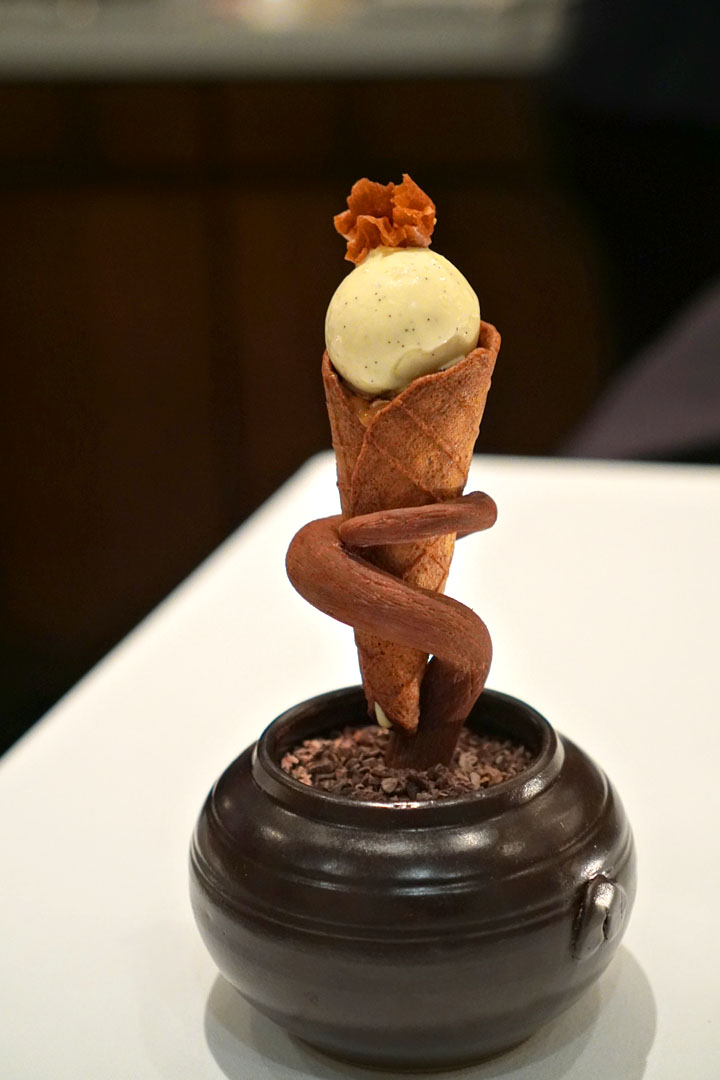
Supplement: NY-Seoul 뉴욕서울 [$15.00] | Tahitian Vanilla Ice Cream, Pecan Cone, Hyeonmi Cream, Pecan Praline
This was a pecan cone filled with pecan praline and brown rice cream, layered with caramel, then topped with Tahitian vanilla ice cream. It was yet another winner, with the ice cream coalescing outstandingly with the familiar, nutty sweetness of both the cone and praline, all while the hyeonmi imparted a roasty twang.
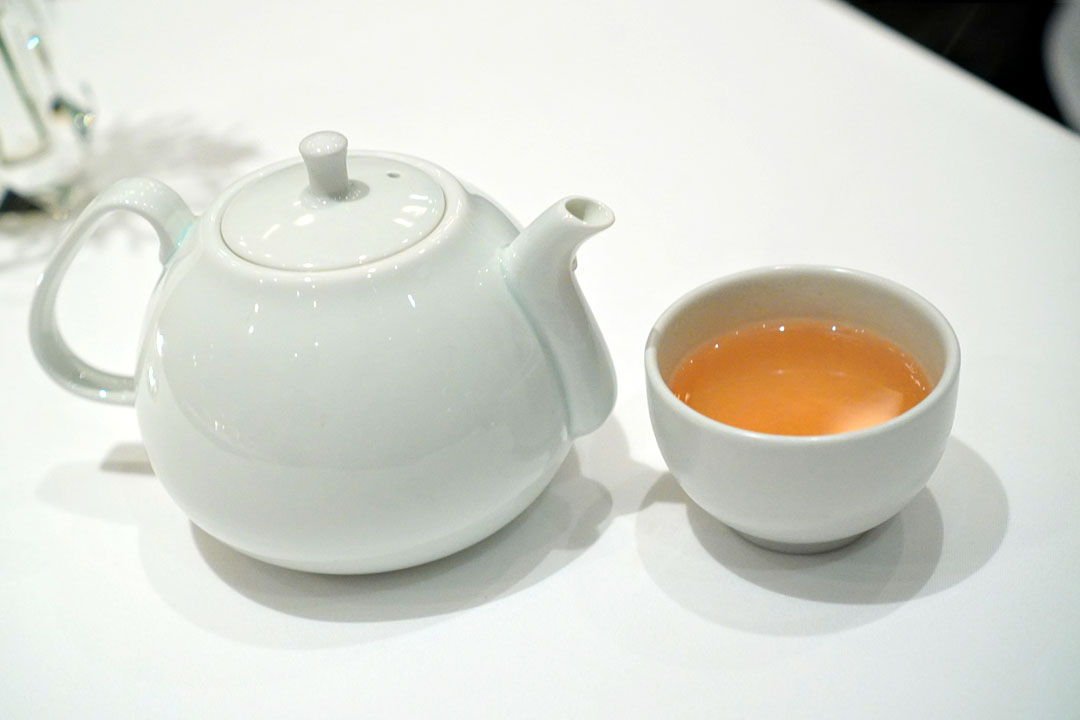
To go along with my sweets, I requested some Wild Persimmon 감잎차 [$18] tea, which actually didn't convey as much persimmon as I was expecting, but instead demonstrated this surprising shrimp-like brine.
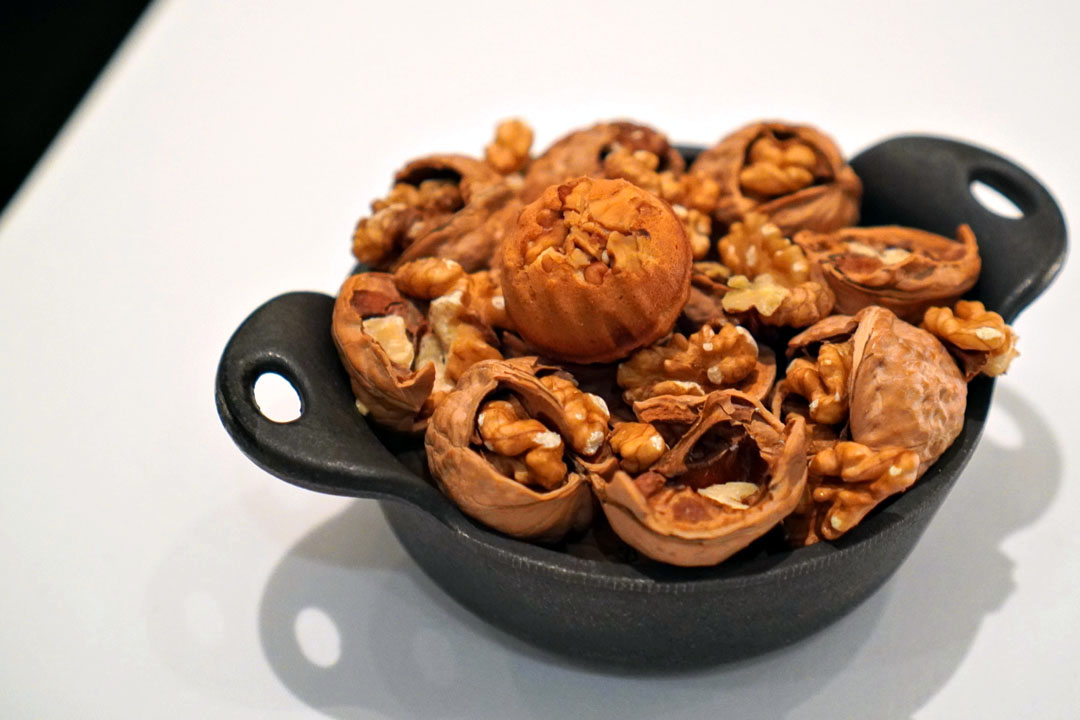
10: Hodugwaja 호두과자 | Walnut Cake, Red Bean Paste
I was a fan of the hodu-gwaja as well. The pairing of walnut cake with the familiar sweetness of patso and pastry cream was marvelous. I wouldn't have minded popping a few more of these.
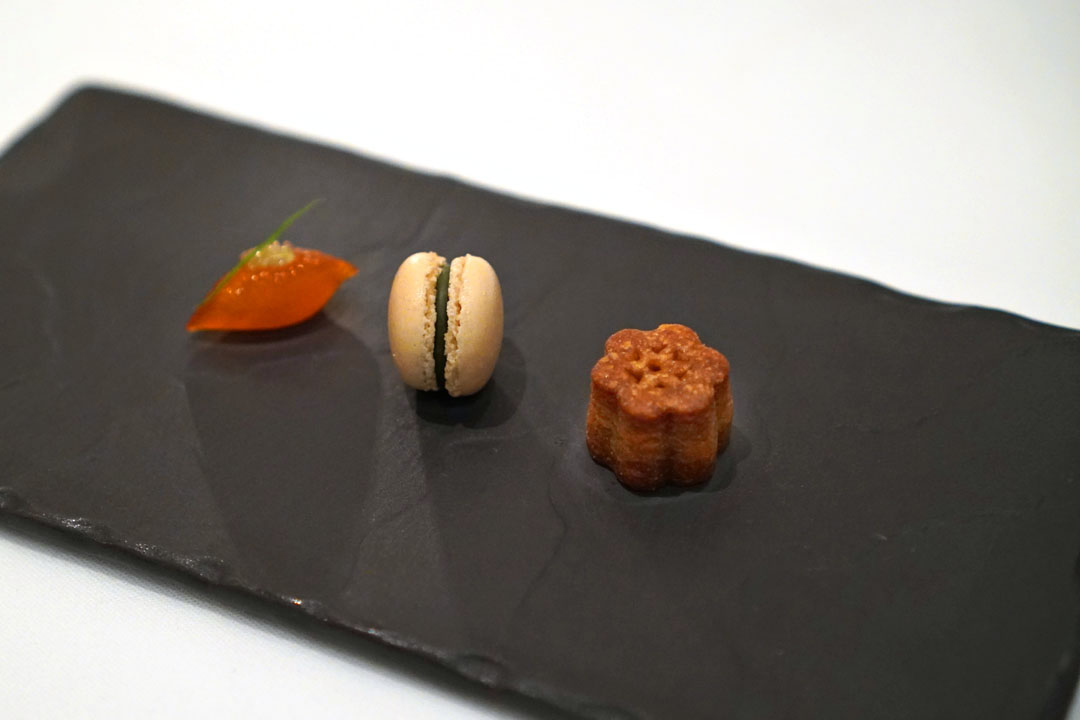
My meal concluded with just about the most petite petits fours I'd ever seen. I started on the right with the miniature yakgwa, a nutty, gritty bite with both a slight bitterness and a touch of honey. In the middle was a tiny macaron flavored with mugwort (ssuk), which actually had a pistachio-like sweetness to it. Last up was a tart, citrusy, herbaceous geumgyul jeonggwa made from candied kumquat and what I believe was lemongrass.
If one is looking to invent the category of contemporary Korean cuisine, then cooking like I experienced tonight is an obvious, effective, and delicious way to start. The food here veers more "Western" than I'd initially anticipated, but that never got in the way of my enjoyment, and indeed, somehow made the Korean influences even more exciting and vibrant. Meanwhile, service, coordinated by GM Kevin Goyenechea, was top-notch, really befitting the refinement of the cooking. My dinner actually exceeded expectations, and it'll be interesting to contrast it with other modern Korean meals, as the trend now is to lean less on the tropes of traditional Eurocentric fine dining like Jungsik does.
2 Harrison St, New York, NY 10013
212-219-0900
www.jungsik.com
Sat 12/02/2023, 05:00p-07:15p

For the final dinner of my recent side trip to NYC, I returned to Tribeca to dine at a restaurant that I'd been wanting to try for the better part of a decade. Jungsik was opened back in 2011 by Chef Jungsik Yim, and is essentially the birthplace of modern Korean cuisine (in the US). It's a genre of cooking that has since grown to be quite influential at the higher echelons of the American dining scene, so I definitely wanted to experience the O.G. for myself.
About the Chef: Yim Jung-sik (임정식) was born in January 1978, and grew up in Suwon. He wasn't particularly interested in cooking as a youngster, but was forced to learn after he started his mandatory military service at age 19. After he got out of the army, he wanted to pursue a career in hospitality, and thus sought out jobs in Seoul, first at a bar, then a rice cake shop, and then a bakery. In 2003, Yim relocated to New York in order to study at the Culinary Institute of America at Hyde Park, where he educated himself in Western cuisine and actually met many of his future employees. Following graduation in 2005, he trained at Aquavit and Bouley in New York, then ate his way around Europe and returned to South Korea. He then went to Spain in 2007, where he apprenticed at both Zuberoa and Akelarre.
Back in Seoul, he was now ready to open his own restaurant, and thus debuted Jung Sik Dang (정식당) in January 2009, located at 567-28 Sinsa-dong in Gangnam. Curiously, the name was meant to be a pun, combing jeongsik (meaning a full-course meal, and the Chef's first name) with sikdang (meaning restaurant). The place generated a fair amount of buzz for its "New Korean" cooking, and in spring 2010, Yim moved Jungsik Dang to a new location at 649-7 Sinsa-dong, near Dosan Park. The original location was converted to a casual eatery called Anzu, which has since shuttered and is now home to an outpost of bunsik specialist School Food. Not long after, the Chef signed a lease on a space in New York City, and the second Jungsik ended up debuting on September 12th, 2011.
Business wasn't particularly brisk at first, but did steadily improve, especially after the place was awarded a Michelin star in October 2012 (the first Korean restaurant to achieve the feat). A second star arrived the following October (another first), and has been retained ever since. In 2014, the Seoul restaurant moved to its current location in Cheongdam-dong, while an attached wine bar called Jungsik Bar launched in 2015. November 2016 saw the restaurant attain a Michelin star in the inaugural Seoul guide, while a second came just a year later, and has also been maintained.
In January 2018, Yim opened Pyunghwaok (평화옥, or "Peace House") at Incheon International Airport. Serving a menu of casual Korean staples, the restaurant expanded to the Hyundai Department Store (World Trade Center) in May 2018, as well as a multi-concept food space called Regular Six in June 2019. However, the mini chain shuttered in April 2020 due to financial malfeasance. In April 2019, Jungsik Bar was turned into an easy-going all-day spot called Jungsik Cafe (정식카페). Yim's latest venture is I Pho U (아이뽀유), a Vietnamese concept that opened in August 2020 inside Hotel Anteroom Seoul.
Unsurprisingly, Yim doesn't spend most of his time here in New York, so the day-to-day is run by Executive Chef Daeik Kim (김대익), a native of Gangwon Province who started cooking for himself at an early age, as both his parents worked. He was also taught by his mother, and went on to attend culinary school in Korea. He subsequently moved to Australia to broaden his skillset, then came to New York to study at the Culinary Institute of America. After graduating in 2018, he joined the team at Jungsik as a sous, and worked his way up the ranks, eventually being promoted to EC in September 2021, replacing Suyoung Park.

Jungsik takes over the former home of David Waltuck's longstanding Chanterelle, which closed in 2009. Shown above is the dining room, an elegant, relatively subdued space that can accommodate up to 32 guests. There's also a bar area, as well as a private dining room that can seat an additional 18.



Jungsik's Signature Menu was priced at a pre-paid $295, plus $26.18 tax and a $5 Tock fee, while standard/premium/non-alcoholic pairings were offered at $200/$500/$115. The restaurant's cocktail list and selection of wines by the glass, sul, beer, tea, spirits and sundry other beverages can be viewed here, while Cameron Dellinger's full wine list is provided here. Click for larger versions.

A meal at Jungsik begins with an array of banchan, reimagined as amuse-bouches.

1a: Jet-Bang-Uh | Doenjang, Celtuce, Gamtae Tuile
I began with the jaetbang-eo, or amberjack, which was paired with dueling forces of earthy soybean paste and juicy Granny Smith apple, while a delicate seaweed powder-enriched tuile offered up a well-placed crunch.

1b: Yukwe | Wagyu Beef Tartare, Truffle, Brioche
This take on a classic tartare was pretty spot-on, the beef arriving full-flavored, gratifyingly-textured, and paired with complementary flavors of cheese and truffle. At the same time, the bread moderated all the elements at play, and provided a nice toasty finish to the bite.

Bussanhaeng [$22.00] | Montreuil Calvados, Absinthe, Pinot Noir Juice
I opted for cocktails tonight, which are the creation of Head Bartender Romeo Lacandola. I began with this Train to Busan-inspired concoction due to its use of calvados, and quite liked its zippy, multifaceted fruitiness, backed by a pronounced herbaceousness from the absinthe.

1c: Gyeranjjim | Soft Steamed Egg, Gamtae Seaweed
The steamed egg ate as supple and luscious as I was hoping for, and I loved the addition of that grassy, oceany seaweed, too--it's something that more restaurants should utilize in their gyeran-jjim.

1d: Joomukbap | Squid Ink Rice, Squid and Shrimp, Gochujang
A truffle-looking jumeokbap was another winner. I was a big fan of the texture on both the rice and seafood here, and the bite's nutty, spicy-sweetness worked for me as well.

1e: Tuna Tomato Tartlet | Tuna Belly and Loin, Meisil Tomatoes
Spanish bluefin showed off a growing savoriness, one offset by the fresh, fruity nature of maesil-marinated tomatoes, tomato gelée, and lime zest, while the tart's pastry base offered up further contrast.

2: Langoustine 랑구스틴 | Oscietre Caviar, Dongchimi Emulsion
In my first proper course, binchotan-grilled Norweigian langoustine was superb texturally, and displayed a sweetness that linked up easily with the saltiness of the Ossetra. However, what really set this apart was that sauce, a creamy emulsion made from dongchimi broth and smoked butter, spiked with zingy anise oil.

3: Octopus 문어 | Gochujang Aioli
In this thoroughly reimagined take on nakji-bokkeum, Spanish octopus was braised in dashi, resulting in a perfectly tender consistency and just the right amount of sweet salinity, while just as important was that crispy crust, which was super savory and oh-so satisfying. The mun-eo was delicious alone, but I also took a liking to the funky heat imparted by that gochujang condiment. This is often considered Jungsik's signature dish, and I can absolutely see why. It's actually a contender for the best octopus I've ever had.

Bori Martini [$26.00] | Jung One, Damsol Pine, Lillet, Sesame, Bori
My next cocktail was a martini variation that really showcased the unmistakable nutty savor of sesame, juxtaposed against the freshness of pine and the roastiness of barley.



4: Wagyu Gomtang Mandoo 곰탕와규만두 | A5 Miyazaki Wagyu, Gomtang Broth
Wagyu mandu were excellent, tasting classic and comforting, with a superb veggie component. The dumplings paired like clockwork with the broth (made from boiling beef bones/feet/brisket for 24 hours), which was simultaneously heady yet light, with a great peppery edge. If that wasn't enough, a silky slice of A5 Miyazaki tenderloin was draped on top of the dish, amping up the deliciousness factor even further. Luxurious yet uncompromisingly cozy, this was another highlight for me.

Supplement: Sea Urchin Bibimbap 성게비빔밥 [$75.00] | Seaweed Rice, Kimchi, Crispy Quinoa
Given my penchant for both sea urchin and bibimbap, this was a must-try for me, and did not disappoint. Sourced from Hokkaido, the seong-ge had that creamy, sweet, saline character that I wanted, and married effortlessly with the nuttiness and savoriness of quinoa, sesame, and roasted gim-boosted rice. This has been a signature Jungsik dish since pretty much the very beginning, and for good reason, but now I'm left wondering: would the dish be even better if done dolsot style, in order to get some nurungji action going?

5: Arctic Char 북극 곤들매기 | Cured and Dry-Aged, Perilla Emulsion
Arctic char was cured with ginger, citrus, and herbs, then dry-aged, then grilled over binchotan, resulting in a properly rare cook and a delightfully crisp, salty, smoky skin. The fish was then accompanied by a piquant, herby emulsion incorporating perilla, kimchi, fermented tomato, and smoked trout roe.

Supplement: Black Cod 은대구 [$45.00] | Doenjang, Shishito Relish, Clam Foam
Alaskan eundaegu was marinated overnight in fermented soybean paste, cooked to caramelized perfection, then served with a shishito jangajji and clam foam. I'm pretty sure that this was the best black cod I've ever had. I loved its super luscious, flaky consistency and buttery goodness, while the doenjang contributed a wonderfully sweet earthiness. Furthermore, the clam imparted a refined saline edge to the fish, while the pickled peppers gave things a prickly heat that served as a great accent piece.


6: Yellowtail Kimbap 방어김밥 | Truffle Rice, Seaweed Bugak
Fatty slices of bang-eo arrived dressed in a particularly nutty soy sauce and garnished with green shiso. The fish was delish alone, but really sang when eaten with the roll, which featured beautifully seasoned truffle rice and zesty kimchi wrapped in some wondrously crispy, grassy seaweed. It was pretty much a match made in heaven. Yum.

Perthimmon Saz [$22.00] | New Riff Balboa Rye, Persimmon, Apricot, Absinthe, Red Shiso
My final cocktail was this rejiggered Sazerac, with its lovely fruitiness right up front, effectively countered by a bevy of bitter, herby nuances.


7: Galbi 갈비 | Wagyu Shortrib, Naengmyun
Four-day-marinated galbi ate supple and fatty, with a familiar sweetness that, fortunately, didn't overwhelm the meat, though I would've liked a bit more smoke and sear, especially since the cut was finished over a binchotan grill. The beef was served with a bowl of mul naengmyeon, and I thoroughly enjoyed the nutty, chewy nature of the noodles, as well as that super refreshing, beef-boosted broth, with its touches of funk and heat.

8: Strawberry 딸기 | Oat Yuja Granita, Tasmanian Pepperberry
Desserts are the charge of Eunchong Kim, another alumna of the original Jungsik who started here in 2022. In my first dessert, a Harry's Berries strawberry sorbet was combined with frozen raspberries and almonds, then topped with an oat-yuzu granita, a drizzle of olive oil, and a sprinkling of Tasmanian pepperberries. Flavors were delectably jammy and tart, as well as simultaneously nutty, with overarching notes of refreshing citrus and just a tinge of pepperiness.


9: Carrot 당근 | Cream Cheese Mousse, Black Tea Ice Cream
In this rather playful dessert, I was asked to "harvest" a "carrot" composed of carrot cake, pecan praline, and cream cheese mousse, all encased in painted white chocolate. It really had that carrot-y sweetness and nuttiness I was looking for, and melded seamlessly with that chocolate-y black tea ice cream. Superb.

Supplement: NY-Seoul 뉴욕서울 [$15.00] | Tahitian Vanilla Ice Cream, Pecan Cone, Hyeonmi Cream, Pecan Praline
This was a pecan cone filled with pecan praline and brown rice cream, layered with caramel, then topped with Tahitian vanilla ice cream. It was yet another winner, with the ice cream coalescing outstandingly with the familiar, nutty sweetness of both the cone and praline, all while the hyeonmi imparted a roasty twang.

To go along with my sweets, I requested some Wild Persimmon 감잎차 [$18] tea, which actually didn't convey as much persimmon as I was expecting, but instead demonstrated this surprising shrimp-like brine.

10: Hodugwaja 호두과자 | Walnut Cake, Red Bean Paste
I was a fan of the hodu-gwaja as well. The pairing of walnut cake with the familiar sweetness of patso and pastry cream was marvelous. I wouldn't have minded popping a few more of these.

My meal concluded with just about the most petite petits fours I'd ever seen. I started on the right with the miniature yakgwa, a nutty, gritty bite with both a slight bitterness and a touch of honey. In the middle was a tiny macaron flavored with mugwort (ssuk), which actually had a pistachio-like sweetness to it. Last up was a tart, citrusy, herbaceous geumgyul jeonggwa made from candied kumquat and what I believe was lemongrass.
If one is looking to invent the category of contemporary Korean cuisine, then cooking like I experienced tonight is an obvious, effective, and delicious way to start. The food here veers more "Western" than I'd initially anticipated, but that never got in the way of my enjoyment, and indeed, somehow made the Korean influences even more exciting and vibrant. Meanwhile, service, coordinated by GM Kevin Goyenechea, was top-notch, really befitting the refinement of the cooking. My dinner actually exceeded expectations, and it'll be interesting to contrast it with other modern Korean meals, as the trend now is to lean less on the tropes of traditional Eurocentric fine dining like Jungsik does.
1 Comments:
Incredible presentation.
Post a Comment
Subscribe to Post Comments [Atom]
<< Home